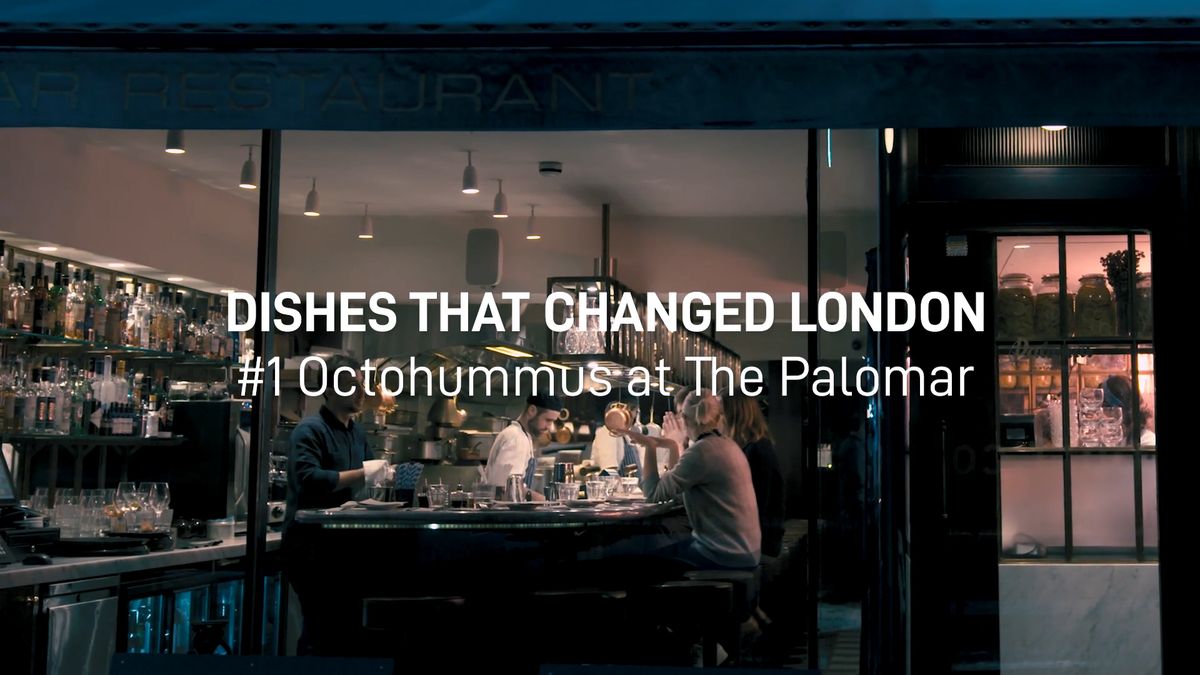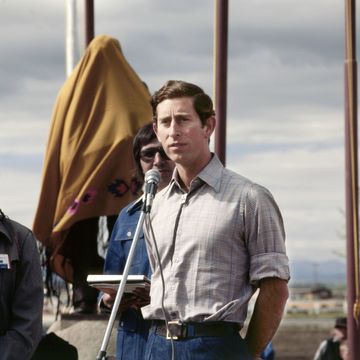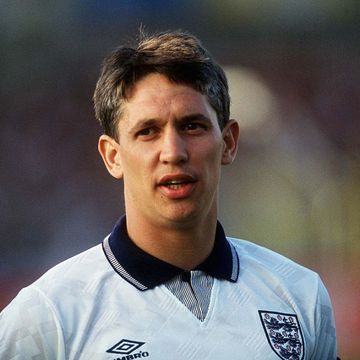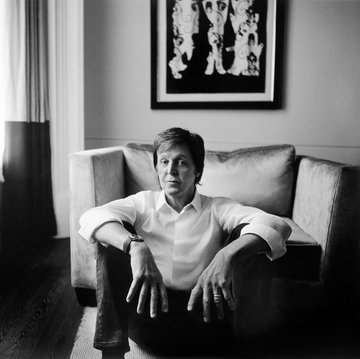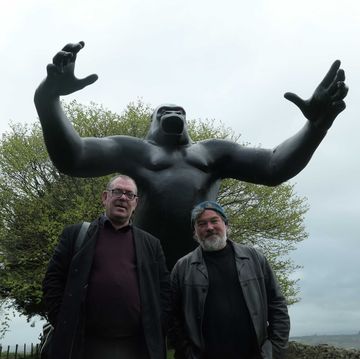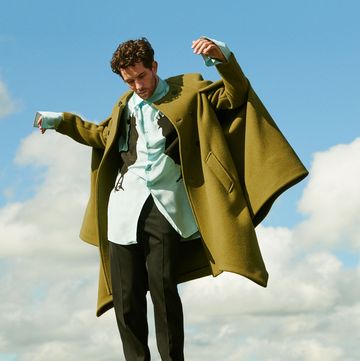For Tim Martin, it had not been a good start to the new year.
The night had begun promisingly enough: his new pub, ‘Martin’s Free House’, was packed with punters ringing in the last hours of 1979 and spending plenty of money at the bar. At six feet six inches tall and close to 18 stone, Martin had been manning the door. But when he tried to explain to a group of men they wouldn’t be getting in that night, a scuffle broke out, punches were thrown and the argument came to a swift and definitive conclusion when an advertising board came crashing through the front window. It wasn’t even midnight, but Martin was forced to close and begin a clean-up operation.
Sweeping up shards of glass from the floor and waiting for someone to come and board up his pub, Martin began to wonder if he’d made a mistake. That night, he decided to press on with his new venture, but made a snap decision. The pub would no longer be known as Martin’s. When the window was replaced a few weeks later, it bore a new name: J.D. Wetherspoon.
Nearly forty years on, J.D.Wetherspoon is Britain’s best known pub chain. The company, known to almost all as Wetherspoon's, operates 900 pubs and employs more than 37,000 people. It has an annual turnover of more than £1.6bn. It is responsible for a thousandth of all the tax paid in the UK. There are more than 50 Wetherspoon's hotels. The company has pubs at eight major airports in England and Scotland, with three outlets at both Gatwick and Heathrow. It is responsible for the UK’s only pub at a motorway service station. In August last year, Wetherspooon's opened Britain’s largest pub, dubbed a Super ‘Spoon’s, in Ramsgate. You have probably drunk in a Wetherspoon's. If you haven’t, you are almost certainly in the minority.
Along the way, Wetherspoon's has taken on a cultural significance like no other pub company. It is favoured by students, pensioners, office workers, labourers, stag parties and hen dos. The company is known for offering the cheapest drinks on the high street, and nothing unites the Brits like their love of a cheap pint. But Wetherspoon's is more than a drinking establishment. In 2015, the Guardian named it the nation’s fifth favourite breakfast destination. It sells more curries in the UK than any other restaurant, and more coffees than anyone bar Starbucks and Costa. It is the world’s largest retailer of Pimm’s. According to market research firm CGA, some 17.4 million people in Britain have eaten at a Wetherspoon's pub in the last six months.
With success has come controversy. Wetherspoon’s increasing market dominance in the early 2010s led one analyst to describe the company as “the Tesco of the pub industry”. Critics, such as the author Will Self, have bemoaned Wetherspoon's pubs as “soulless” and “corporate”. In 2010, when the company revealed plans for a pub in the New Forest, residents wrote to the council listing more than 40 reasons why the chain should be barred from opening. Plans for a Wetherspoon's in a former opera house in Tunbridge Wells are said to have caused one resident to stage a hunger strike.
And yet, it is also the subject of social media fan sites and stocking filler books and devoted fans - like Mags Thomson, who has visited more than 1,000 Wetherspoon's pubs since her first visit to the Monk’s Retreat in Reading back in 1994 (hundreds of which have since closed), and only has 26 left to go.
All of which begs the question: is Wetherspoon's a national treasure, or just an unstoppable behemoth built on cheap beer and a bland aesthetic? Perhaps this is a false dichotomy. Pete Brown, a British beer writer whose books include The Pub: A Cultural Institution, told me: “It’s my maxim, it has been for years, that every single aspect of a Wetherspoon’s is either brilliant or fucking awful, and there’s nothing in between.”
Whatever you opinion, Wetherspoon’s evolution, from one pub in North London to a household name, is one of our country’s most successful - and divisive - business stories of the last 50 years. And it’s a story that begins and ends with one of the most pioneering and eccentric businessmen Britain has ever produced.
It was the summer of 1979 when Tim Martin discovered Marler’s. Before long, he became a regular. The small pub in Muswell Hill was a four-mile round trip from his home in Wood Green, but the journey was worth it; Marler’s was the only place in North London where he’d found a decent pint of real ale. As he sat at the bar, Martin would think about business opportunities. At one stage, he dreamed of opening a squash club. But when Andrew Marler, the pub’s owner, decided to sell up six months later, Martin made him an offer: £40,000 in cash, a house in Putney and a two-week holiday at his dad’s place in Jamaica. Marler accepted.
Martin’s troubles began before he’d even picked up the keys. In early December, he arrived to sign a contract taking over the lease. Marler suggested Martin stick around for a celebratory drink. The two men sank a couple of pints of real ale, then a couple more, then probably one more for the road, and at some point in the early hours Martin stumbled into the street, making it a few hundred metres before collapsing outside a block of flats. He was saved from a night in the cold by two men who, after spotting him from their flat on the second floor, invited him upstairs to sleep off his condition on their sofa.
One week later, Martin arrived for his first day as a landlord, only to find he couldn’t unlock the door. The 24-year-old law graduate grew increasingly red faced as he struggled with the keys while his new neighbours opened up for the day. Several hours later, after a visit from a locksmith, Martin got the doors open but the cleaners had long gone, leaving him to explain to the pub’s regulars why the place was filthy.
After the incident on New Year’s Eve, Martin took inspirations for the pub's new name from an old schoolteacher of his in New Zealand who’d been unable to control his unruly class, Mr. Wetherspoon. The initials were taken from JD Hogg, a character from the TV show Dukes of Hazzard.
He may not have known how to run a pub, but Marler says Martin displayed a strong business mind from the start. The two became good friends after the sale and would walk their dogs together, discussing the trade and Martin’s business plans. “He was always seeing the central point quicker than anyone else,” remembered Marler.
The chaos of the first few weeks was soon replaced by what Marler described as “dogged self-discipline”. Well before the first pub had begun to turn a profit, Martin was on the lookout for his second premises. In 1980 he found a dilapidated former motorcycle showroom in Crouch End. Martin borrowed more money, bought the property for £38,000, and spent the next few months securing planning permission and a licence. Building work took longer than planned, so the pub opened in August 1981 with a tarpaulin still stretched over part of the roof.
Martin repeated this process hundreds of times over the following decades. Pub entrepreneurs before him had expanded by buying leaseholds on existing pubs. These were typically ‘tied’ - meaning beer had to be bought at prices dictated by brewery landlords. Buying non-licensed properties for conversion meant Martin could operate free of brewery ties.
Of course, the breweries put up a fight. “He became a master of licensing applications,” said Marler. “I remember many times he would amble into court with his trademark mullet and open necked shirt and jacket carrying all his papers in a plastic carrier bag.” Martin’s appearance belied his sharp mind and legal training. Marler said: “As far as I can recall he never lost a licensing application despite huge staged objections by the local publicans.”
Martin based his pubs on a handful of principles inspired by The Moon Under Water, a fictional pub described by George Orwell. “In the Moon Under Water it is always quiet enough to talk. The house possesses neither a radio nor a piano,” Orwell wrote. Martin provided no jukeboxes, TVs or pool tables in his pubs. He insisted on high standards of service. Lorna Scoullar, a regular at the first pub, recalled an efficiently run bar, where employees wore blue and white butchers’ aprons, and empty glasses and ash trays were frequently cleared. “I felt it was a cut above other drinking establishments,” she said.
Early on, Martin decided to raise prices. It was, said Marler: “The only mistake I saw him make.” As business dropped off, Martin reversed his decision and tempted drinkers back by offering pints of Abbot Ale for 40p. Prices have stayed low ever since.
While the pubs failed to make money for the first four years, Martin ploughed on, establishing Wetherspoon's all over north London. In 1984, Wetherspoon's turned a profit for the first time. By 1991, the company was reporting profits of more than £1 million. Martin was certain his pub formula could be replicated all over the country but, to do that, he needed to take the company public. He applied the same sense of formality to his meetings in the City as he did to licensing applications, turning up to a meeting with the company’s pinstriped bankers while wearing shorts and a T-shirt. Nevertheless, on 20 October, 1992, J.D. Wetherspoon floated on the London Stock Exchange. The company was valued at £45.6 million.
Wetherspoon’s expansion kicked into overdrive. At the time of flotation, the company was operating 44 pubs, mostly in north London. The following year, the company opened its first pub outside the M25, in Bracknell, and followed up with pubs in Norwich and Reading. In 1994, the company moved to new head offices in Watford and opened its 100th pub, The Moon Under Water, just down the road.
Martin sought to instil his business philosophy in the expanding management team. He had long been a voracious reader of books by business titans and none influenced him more than Walmart founder Sam Walton. Senior managers were handed copies of Walton’s book, Made In America, and tested on its contents.
Made In America is a biographical story, but it’s also a deeply practical book, ending with Walton’s 10 rules for business success. “Rule seven: Listen to everyone in your company.” All Wetherspoon senior management had to work shifts in the company’s pubs. Rosalyn Schofield, the company’s former legal director, said: “I remember thinking initially, I didn’t do my law degree to go and pull pints in a pub. But that was what was expected and I totally got to see why.” Directors would work a shift every six months. “The pub managers would take delight in making you clean the toilets and all of that,” said Schofield. The rule didn’t just apply to management: architects had to work pub shifts before they’d be awarded a Wetherspoon contract.
“Rule nine: Control your expenses better than your competition.” Schofield was in the room for discussions with Guinness as Wetherspoon's prepared to open its first pub in Northern Ireland. Price was a sticking point in negotiations, and the brewery refused to budge. “They said, you can’t open in Ireland without selling Guinness,” Schofield recalls. “Tim just said, watch me. And he did.”
Wetherspoon's did everything it could to gain the upper hand in negotiations. At the time, pubs typically relied on breweries to deliver beer and provide dispensing equipment. Wetherspoon's established its own distribution network, bought its own taps, and forced prices down. Nathan Wall, the company’s former operations director, told me: “It was taken straight out of Walmart: We will not be beholden to our supply chain.” He added: “There’s this urban myth that Wetherspoon's sells close-dated beer. When I was at Wetherspoon's we sold 12 million pints of beer a week. The logistics of finding 12 million pints of short-dated beer is just impossible. The reason they get their prices so low is absolutely, 100 percent down to volume and having their own distribution network.”
In April 1996, Wetherspoon's entered the FTSE 250 for the first time. In 1998 the company opened 100 pubs, including seven on one day, and was recruiting 250 people a month. Martin could no longer handle all the licensing hearings on his own. John Hutson, who joined the company as an area manager in 1991, was chosen to share the burden. The two men travelled the country, Martin still carrying his papers in a plastic bag, fighting licensing battles and establishing outposts of Wetherspoon's wherever they went.
“Rule six: Celebrate your successes … Don’t take yourself too seriously.” As Wetherspoon's grew, colleagues recall how Martin’s personality still permeated the business. Every month, pubs would receive a recorded message from head office, known internally as the ‘Tatler video’. Martin recorded many of his segments in fancy dress, appearing one month wearing a Viking helmet. “He would deliberately play stuff for laughs,” said Matthew Blain, the company’s former head of training. “People would want to tune in to see what Tim was up to next.”
In 2000, Wetherspoon's embarked on its first departure from Martin’s golden rule: no music or TV. It wasn’t entirely planned. In July that year, the company bought 10 Lloyds No. 1 bars from a regional brewer, intending to convert them into Wetherspoon's pubs. As a first step, the bars adopted Wetherspoon’s pricing and menus; sales immediately began to rocket. Within a year, takings doubled, with no discernible impact on Wetherspoon's pubs nearby. Martin bullishly declared he would open 500 Lloyds No. 1s.
It seemed as if Wetherspoon's couldn’t help but succeed; even if it was by accident. Since its stock market flotation the company had grown from 44 pubs to more than 600. Turnover had increased by a factor of almost 30. Then, in November 2002, almost exactly 10 years after flotation, Wetherspoon's warned investors that profits could be down 10 percent on expectations. The company’s shares plummeted by 28 percent. In his next chairman’s statement, Martin warned that, while there remained opportunities to grow, “increased red tape and taxation means that it is prudent to reduce the rate of that expansion”.
Martin appeared embattled. He had become an increasingly public figure, speaking out against licensing reform, taxation, regulation of the pubs industry, and against membership of the euro. Martin’s position, that currencies could not function unless linked to a national government, led to appearances on Panorama and Any Questions. He engaged in public spats with other industry leaders.
In September 2003, Martin took a six-month sabbatical. When he returned, he announced he was becoming part-time chairman. Hutson became the company’s chief executive. “It definitely introduced a question for people about what was next for Wetherspoon's,” said Blain. “Do we lose some of that quirkiness and some of that fun and become just another plc pub company?”
Martin was born on 28 April, 1955, in Norfolk. He had an itinerant childhood; the Martin family moved to Northern Ireland when he was six, to New Zealand four years later, then returned to Northern Ireland shortly before Martin turned 15. His parents divorced shortly afterwards and Martin stayed with his father, Ray. A short time later, Ray moved to Jamaica and Tim stayed behind, living with another family while he studied for O levels and A levels, before going to Nottingham University to study law, where he met his wife Felicity.
After finishing his degree in 1977, Martin spent six months working in a pork pie factory then six months selling advertising for a newspaper. He returned to sit his bar exams, passed, but decided against a career as a barrister. For a short time, he thought he could become a world champion squash player - before realising this was less an ambition than a dream. “At that stage in my life I realised, thinking big, it doesn’t necessarily follow that you’ll be good at something,” he told me when we met at the Metropolitan Bar in London’s Baker Street. But Martin retained his ambition and applied it to the world of business, setting his sights on running a national chain even while struggling to turn a profit with his first pub.
It’s fair to say Martin looks at home in a pub – something he believes separates him from many of his peers at the top of the industry. Over the years he has cultivated a reputation as an outsider, some of which can no doubt be attributed to his early battles with the established operators. “I tried to cool it with our competitors in recent years,” he said. “But I’m sure a lot of them think I’m a total prat!”
As he recounted how he built his business, Martin told many stories which focused on his early mistakes. “I didn’t really know what I was doing, and any ideas that I did have were probably misplaced,” he said, laughing frequently, often at his own expense. When I read him one analyst’s verdict of Wetherspoon's from 1998, which described the company as a “three-legged stool at risk of falling over”, he chuckled. “That’s a great one.”
While Martin appears to care little what others think about him, there’s also a sense in which he wants to prove his doubters wrong. When Wetherspoon’s floated on the stock exchange, a column appeared in the Times which criticised the chain’s policy of converting shops into pubs, advising investors to shun the company’s stock. Twenty-five years later, Martin still has the article mounted on his office wall.
Also on the wall is a list titled: Eternal Truths of business and life. It’s a mix of quotations Martin has collected over the years, alongside his own pearls of wisdom which are attributed to the pseudonym JJ Moon. (The name has also been used for five Wetherspoon’s pubs - it was inspired by a fictional surf star created by Surfer magazine in the 1960s.) They include “Who’s number one? The customer.” - Sam Walton, and “Beware the expert.” - JJ Moon.
Another quote reads: “We never get tired, we never get depressed.” I asked Martin where it came from. “That was one I remember reading in Time magazine from a couple of basketball players in America in the ‘70s. They said to these guys, how come you’re so good? I thought it was a good line really. Because, I mean, you do get tired, you do get depressed. But you have to push ahead the whole time.” So why did he consider stepping away from the business? “I think I was just assessing things then: ‘I’ve been doing this for a long time, let’s give it some thought, and just take a bit of a break’.”
Martin walked his dog, did plenty of exercise, and studied French three mornings a week. Six months later, despite announcing he was returning to work part-time, he gradually found himself drawn back into the business. “I realised in the end we’re built to work,” he told me. “And if you do eight, nine, 10 hours’ work a day, you’ve still got time to have a couple of pints and you enjoy them a bit more. You’ve still got time to read the paper, you might even read a book, and what else is there? You’ve still got time to chat to the missus.”
When Martin returned to Wetherspoon's, it was not to a traditional chairman’s role. These days, he sees himself as a conduit for ideas from the shop floor to reach the top of the business. He spends his time touring the company’s pubs, speaking to staff, and taking fastidious notes. Which drinks should be stocked? What is the optimum size of menu? Should the ketchup be non-brand or Heinz? “The great danger comes when a CEO with a big ego thinks he knows the answer to those questions,” he said.
John Hutson, who has served as chief executive since 2003, once said: "Time identifies the problems and it's my job to solve them." And yet, at board level, things haven’t always been harmonious. Mark McQuater joined Wetherspoon's as managing director in 1994, resigning two-and-a-half years later “to pursue other interests”. In 2010, finance director Keith Down and chief operating officer Paul Harbottle unexpectedly resigned. All three former directors declined to comment for this article.
The departures have raised questions about the extent to which Martin is able to tolerate competing opinions at senior level. At the time of Harbottle and Downs’ departures, shareholders told the Financial Times there had been a “difference of views” with Martin. There are other indications that Martin has retained a tight grip on the business as it has grown. One former acquisitions surveyor at the company told me Martin was closely involved in individual property transactions, even after becoming chairman. “Everything went through Tim,” he said. “I was on the phone to Tim daily saying, I’m looking at this, what do you think about it?”
In Martin’s recollection, directors have occasionally left after failing to adjust to the way Wetherspoon's is run in a “collegiate way, a democratic way, emphasising the ideas from the shopfloor”. Staff members are encouraged to suggest business ideas. (The Swedish cider Kopparberg was introduced to the UK by Wetherspoon's after a recommendation from a Swedish employee.) Martin told me: “Most of the ideas don’t come from me.” Nevertheless, some of the company’s most pivotal decisions can be traced back to the chairman. Wetherspoon’s success looks to have been achieved through a careful balance of the democratic and the dictatorial.
One such decision came when Martin walked past a Starbucks many years ago: “It was 3 o’clock in the afternoon and the place was full.” In 2000, Wetherspoon's began selling coffee nationwide. The following year, the Independent reported the chain had been “hit” by its “extravagant promotion” of coffee. Five years later, Wetherspoon's announced it was selling as much coffee as Caffè Nero.
By then, Wetherspoon's had turned its attention to breakfasts. The company had been building up food sales since the late ‘90s with the help of renowned food critic Egon Ronay. “Egon was a pain in the backside, God rest his soul,” said one former director. “He would literally sit in our board meetings and rip our menu apart.” In 2002, under Martin’s direction, the company began opening at 10am to serve breakfast. The gamble worked. In less than five years, the company was selling 200,000 breakfasts a week.
When fears about the impact of the smoking ban spread throughout the pubs industry in the early 2000s, Martin took decisive action. In January 2005, he announced all new openings would be non-smoking and that all Wetherspoon's pubs would be smoke-free - well in advance of the ban. “The rest of industry just thought we were absolutely nuts,” recalled Wall. Nine months later, turnover in affected pubs was estimated to have fallen by seven percent. By March 2006, even Martin’s confidence seemed to be wavering. Wetherspoon's announced it would hold off on further non-smoking conversions but, in the background, the company was focused on learning lessons from its smoke-free pubs and visiting the US and Ireland to assess the impact of smoking bans abroad.
England’s smoking ban came into force in July 2007. Across the pub industry, beer sales dropped by as much as 10 percent. Pub numbers, already in decline, went into freefall, a trend exacerbated by the 2008 recession. Wetherspoon's saw profits recede in 2008 and 2009, but held firm to its strategy of boosting food sales and focusing on breakfast and coffee. In 2010, profits rebound by more than a third. For many other operators, the rebound never happened.
Wetherspoon's spotted an opportunity. For the first time, the company began buying up existing pubs in significant numbers. In 2008-09, Wetherspoon's opened 39 pubs, the highest number for six years. Hutson told the Morning Advertiser: “In the current market we can get a pub for next to nothing.” Between 2009 and 2014, Wetherspoon's opened an average of more than 40 pubs a year, the second highest rate of expansion in its history.
That Wetherspoon's has thrived at a time of general decline for the pubs trade is beyond question. The extent to which the company is responsible for pub closures is the subject of debate. Supporters claim the chain brings trade to neglected areas, which benefits all operators. But Wetherspoon's critics argue independents are simply unable to compete. The chain has certainly been aggressive in staking out territory. For many years, the company displayed the prices of rivals, including independents, on signs at the bar (it was reported to Trading Standards by rivals more than once for allegedly displaying incorrect information). In 2003, the company attracted controversy for a recruitment stunt which involved sending parcels to staff at rival pubs containing letters of resignation made out to their current employers. One landlord told the Morning Advertiser at the time: “I worked in the double-glazing trade for 20 years, but even they wouldn’t stoop to such levels.”
The Federation of Licensed Victuallers Associations, which represents independent licensees, offered a tone of resignation when I asked about Wetherspoon’s impact on the pubs trade. “They have damaged our members’ business,” said operations director Martin Caffrey. “But, you know, it can’t be stopped.” Caffrey told me independents struggle to compete with Wetherspoon’s on price, but this is often down to their ties with breweries. It’s a view shared by Martin. “I have sympathy,” he said, for struggling independents. “But I think the real problems that arose in that area came from the tied leases.”
In August 2017, Wetherspoon’s opened the UK’s largest pub, in Ramsgate, taking over the town’s derelict Royal Pavilion. When I visited on a Monday lunchtime in February, the pub was doing a brisk trade. A few days after my visit, the Belgian Cafe, an independent bar and restaurant opposite the Royal Pavilion, closed down. Andy Barrett, who founded the business 18 years ago, said takings had steadily declined since Wetherspoon's opened: “It started to drop off immediately really and it just never came back.” The landlady of another pub had experienced a similar fall in trade. “It’s a lovely building and it’s fantastic what they have done to it,” she told me, “but I’m not saying it’s good for the pubs.”
Has Wetherspoon's achieved the ideals set out in George Orwell’s essay? “We’ve achieved something,” Martin told me. “Whether it’s exactly the idyllic dream pub that Orwell perceived, I’m not sure. I think his is slightly more of... almost a dream. The roses round the door, the avuncular mine host. Not too many people combine that with good food and a superb selection of drinks. But we’ve done something.”
At a meeting of CAMRA’s North London branch in January this year, I asked for a show of hands indicating support for Wetherspoon's. Roughly two-thirds of the assembled members raised their arms in the air. One said he was ambivalent about the chain, a view which attracted murmurs of assent. “The beer is reasonably priced, they do a really good range, you can always get something a bit different in there,” he said. “That's the positive side. The negative side is you don't get the kind of atmosphere you do in a traditional pub.”
One of the frequent accusations levelled at Wetherspoon's is that it operates ‘identikit’ pubs, lacking individuality and character. In 2015, evidence emerged to refute this claim. Writer and publisher Kit Caless was sitting in a Wetherspoon's in Canterbury when he noticed the pub’s extravagantly designed carpet and began wondering if all Wetherspoon's carpets were the same. When he visited his local Wetherspoon's in Hackney, he was intrigued to discover a completely different design. Caless began posting photos of Wetherspoon's carpets online and, soon enough, fellow pub fans were sending him pictures of carpets from all over the country. No two were the same. In October 2016, Caless published Spoon’s Carpets: An Appreciation.
To compile the book, Caless travelled to 150 Wetherspoon's in five weeks. At one point, he visited five pubs in one day. Caless observed the way in which the clientele and atmosphere changed throughout the day. “They were completely different experiences all the way through,” he said. “And yet, the pub itself, apart from the carpet, that didn’t change.” Caless told me he has struck by the difference between Wetherspoon's and a pub he used to run, where the staff would play their own music, attracting drinkers who shared the same tastes. “That’s a bit like having a boutique hotel and something that’s carefully designed with a clientele in mind,” he said. “Then you’ve got Wetherspoon’s and Premier Inn, which are not designed for anyone. And in that way, they’re also designed for everyone.” Essentially, he said: “Wetherspoon’s is whatever you want it to be.”
Over the years, Wetherspoon's has done everything it can to strip away reasons not to visit. It caters to as wide a customer base as possible, at every hour of the day. It offers a huge selection of drinks at budget prices and offers vegetarian, vegan and gluten-free menus. It frequently takes a clean sweep at the ‘Loo of the Year’ awards. While Wetherspoon's began by seeking to capture the values of a traditional pub, the reason for its endurance lies in the way it has continually adapted to changes in British society. At the same time, its competitors have fallen by the wayside. Perhaps they were unable to compete with the company’s aggressive pricing. More likely, they simply failed to recognise that the last 40 years have seen a fundamental change in what it is we want our pubs to be.
Better than anyone in the pubs trade, Martin foresaw that change and exploited it to Wetherspoon's full advantage. Then, in 2016, he sense another change on the horizon - one that would alter the course of British history and his own public profile for good.
In February that year, Martin called Eddie Gershon, his long-standing PR man, and told him: “I’m donating £200,000 to the Leave campaign and I really want to put my view out there.” Gershon got to work. In the four months leading up to the EU referendum, Martin carried out more than 350 media interviews. Wetherspoon's printed 200,000 beer mats making the case for Brexit and distributed them in its pubs.
Martin is not a typical Brexiteer. For starters, he is pro-immigration. When Wetherspoon's repeated its beer mat stunt in November last year, distributing 500,000 printed with a ‘Wetherspoon Manifesto’, he called for Britain to “unilaterally and immediately” grant citizenship rights to legal EU immigrants. His vociferous support for Brexit stems from his unwavering belief in the power of democracy, and his equally strong view that the EU is fundamentally undemocratic. In the latest issue of Wetherspoon News, the company’s quarterly free magazine, Martin writes in favour of populism, concluding: “It’s painful for big egos to accept, but the public really does know best.” I asked Martin how he came to believe so strongly in this philosophy. “Because it’s worked,” he said. “When we adopt the approach at Wetherspoon, every time, they’re right.”
While Martin is at pains to attribute Wetherspoon’s success to the “collective intelligence” of his staff, the truth is that few can imagine the company without its founder. But Martin will turn 63 in April. As time goes on, questions about his succession become increasingly pertinent. This year, he will hold discussions with his senior executives “to thrash out a plan”. Not with any individual in mind, he said, but with a view to setting out a business philosophy. Like a Wetherspoon's constitution? “Almost a constitution. A blueprint really.” The document will be less a retirement plan than an insurance policy. “I’m accepting that I’m not immortal. Which takes some doing!” he laughed.
When Martin rails against ‘the elite’, which he does frequently in the pages of Wetherspoon News, he risks charges of hypocrisy. He is, after all, one of the UK’s most high-profile businessmen. His £300 million-plus fortune makes him a regular feature of the Sunday Times Rich List. But, unlike the elite he lambasts, Martin remains relatable. When William Hague claimed to have drunk 14 pints a day as a young man, he attracted ridicule. With Martin, you could just about believe it. He spends his week in pubs. He still drives a Volvo. He is a political paradox: the straight-talking multi-millionaire businessman who represents the man on the street. Ralph Findlay, the chief executive at Marston’s, told me he’d only once met Martin outside the Metropolitan Bar on Baker Street. “I ran into him at a reception at Number 10 two or three years ago,” he said. “And I’d say that he was much much more comfortable at the Metropolitan Bar than he was at Number 10.”
Would Martin ever stand for office? Andrew Marler told me: “If he wanted to be a politician I think he should become minister of common sense. I think he'd do quite well, but they wouldn't pay him enough!” When I put the proposition to Martin, he said: “I think I could do it. I’m not sure how successful I’d be, because like many things it’s more difficult than it looks. But I wouldn't do it because I’m happy running my pub business.”
One can imagine Martin casting his mind back to those first few hours of 1980, as he gazed upon an empty bar, a broken window, and questioned his future as a publican. Perhaps he has lost some of his early hubris and come to recognise his limitations. There are certainly plenty of people who think Martin should stick to what he knows. But then, as Sam Walton wrote: “Rule 10: Go the other way. Ignore the conventional wisdom.”



